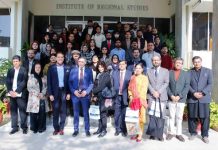ISLAMABAD, NOV 19 /DNA/ – Pakistan’s export-oriented textile economy has received a timely uplift with the signing of a new cooperation pact between senior Pakistani industry figures and the Brazilian Textile and Apparel Industry Association, setting the stage for expanded trade, diversified raw material sourcing, and climate-aligned industrial growth. The development comes at a moment when global supply chains are undergoing rapid transformation, driven by sustainability benchmarks, shifting buyer preferences, and the need for resilient cross-regional partnerships.
The agreement was formalized at the NCI Pavilion in the Blue Zone of COP30 in Belém, Brazil, where Dr Ayyaz Uddin, a key leader and representative of Pakistan’s apparel and export sector, joined Mr. Fernando V. Pimentel, CEO of ABIT, for the signing ceremony. Taking place on a global climate platform, the pact carries economic significance beyond a traditional trade arrangement, reflecting how environmental and market competitiveness are now deeply intertwined for textile-producing nations.
For Pakistan, one of the world’s leading textile and apparel producers, the pact offers strategic benefits. Chief among them is the opportunity to diversify its raw-material base through the potential import of high-quality Brazilian cotton, known for its consistency and sustainable production profile. This diversification is increasingly important as global buyers demand verifiable, climate-conscious sourcing and as textile mills in Pakistan seek to reduce supply chain volatility linked to domestic crop fluctuations.
In a joint statement, PRGMEA former chairman Ijaz Khokhar and north zone chairman Dr Ayyaz Uddinobserved that the new Pakistan–Brazil collaboration is poised to enhance bilateral economic ties by focusing on sustainable cotton sourcing, responsible manufacturing, innovation exchange, and greater participation in international apparel markets. They emphasized that such cooperative frameworks are becoming critical for countries like Pakistan, whose textile sector—contributing the largest share to national exports—must rapidly align with global climate commitments and traceability standards.
They noted that the understanding will unlock pathways for meaningful business-to-business engagement, enhanced design and fashion collaboration, and more frequent industry delegation exchanges between the two countries. He added that Pakistan intends to welcome a Brazilian textile delegation—along with other International Apparel Federation (IAF) member associations—to TEXPO 2026, turning the event into a platform for deeper sectoral integration, new trade linkages, and joint innovation ventures. These efforts, he said, are aligned with Pakistan’s broader goal of positioning itself as a reliable supplier of value-added apparel in competitive global markets.
They emphasized the export-sector implications of the pact, stating that sustainability is rapidly becoming a prerequisite for maintaining and expanding global market share. With international buyers adopting climate-linked compliance systems, Pakistan’s industry is working to decarbonize operations through renewable energy adoption, biodiesel and biochar integration, virtual power purchase agreements (VPPAs), circularity initiatives, and emerging green-financing frameworks. He observed that the new collaboration with ABIT strengthens Pakistan’s efforts to build a unified national climate narrative—one that links industry, government, and academia—ensuring exporters remain competitive, future-ready, and resilient.
The MoU outlines long-term cooperation in key areas: sustainable Brazilian cotton sourcing for Pakistan’s textile value chain, expanding Pakistan’s apparel exports to Brazil and other global markets, advancing circularity and climate-aligned industrial practices, and promoting knowledge sharing under IAF-led platforms. Its signing amid COP30 underscores how trade alliances are increasingly shaped by climate transitions and sustainability-led industrial reforms.
As Pakistan’s apparel sector continues its engagements at COP30 as an Observer Organization, the Pakistan–Brazil textile pact emerges as a forward-looking model of South–South economic cooperation. It blends trade, climate responsibility, technology adoption, and capacity building—elements that are crucial for any export-dependent sector navigating new global norms.
For Pakistan’s wider export ecosystem, the agreement signals expanded market connectivity, strategic diversification, and a stronger foundation for long-term, climate-resilient growth.

















